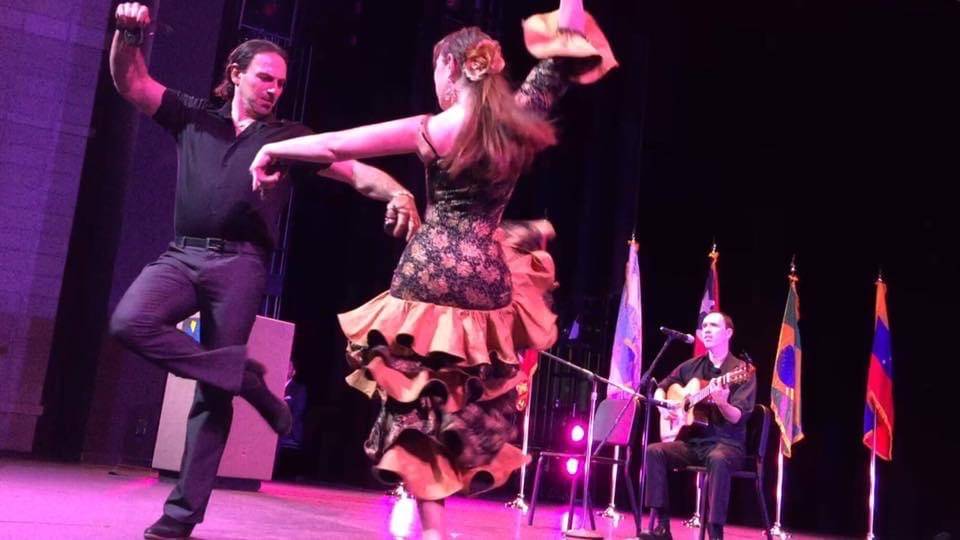Las Vegas man was picture of health before he died from COVID-19

An avid flamenco dancer, Artor Nazzari was the picture of health before he fell fatally ill to COVID-19.
The 42-year-old father of three didn’t smoke or drink and exercised daily, said his wife, Carissa Hernandez, who works as an emergency room nurse at the VA Medical Center in North Las Vegas and had taken care of coronavirus patients since the initial outbreak in March.
“He was in the studio practicing every day,” she said. “It was unbelievable, his lungs were in great shape. Even to this day when I think about it, it doesn’t make any sense to me.”
Nazzari was happiest on stage, Hernandez said. The couple met at a flamenco dance competition and later started a flamenco dance company called Fuerza Flamenca in Las Vegas.
“In public he was more reserved and more private. But when he got on stage, that’s where he let out his heart and soul,” she said. “He loved it more than anything in the world.”
Nazzari was laid off from his job as an aircraft inspector at Gulfstream before he fell ill.
Started with ear infection
Nazzari’s health started to decline in May with an ear infection. The couple tried to remedy the infection at home, but his condition got worse and antibiotics weren’t working, Hernandez said.
He went to the emergency room at Sunrise Hospital and Medical Center and underwent surgery. Then four or five days after he was discharged, Nazzari developed a fever.
Related: Here’s how to help us tell more stories about the state’s COVID victims
“I just assumed he just had a bad reaction to the ear,” Hernandez said. At the hospital, they found Nazzari had bilateral pneumonia. “I thought, geez where did this come from?”
From then on, Hernandez and the family hunkered down.
Hernandez and her 4-year-old daughter, Arabella Nazzari, contracted the virus from Nazzari, though both had mild symptoms. Daughters Alicia Nazzari, 10, and Adrianna Nazzari, 8, did not get sick. Hernandez worked to take care of her sick family members while also making sure her other children stayed away from those infected.
After about 14 days, things were looking better.
“He started to improve. His appetite came back. He felt he was turning a corner and getting better,” Hernandez said. “He was finally on the road to recovery.”
At the beginning of July, the entire family tested negative for the virus.
Then a week later, Nazzari started feeling ill again. His ankles and feet were swollen, and it looked like he was bleeding under his skin.
“They did another COVID test and he tested positive. From there everything went downhill really fast. When I took him to the hospital never in a billion years did I think I wasn’t going to bring him home,” Hernandez said.
All of a sudden, the ER nurse found herself on the other side of her occupation.
“Even with all my medical knowledge, all my training, I was completely helpless to help my husband,” Hernandez said. “I felt like I had the weight of the world come crashing.”
Narazzi went to MountainView Hospital and died there July 19.
Praise for health care workers
After Nazzari’s death, Hernandez said she was surprised to receive a phone call from the doctor who tried to treat him. He told her how much the case touched his heart.
“He said they were trying to figure out why a healthy 42-year-old man died from the virus, not only so I could have answers, but to also make sure this doesn’t happen to anyone else,” she said. “It really evidenced how much they truly cared.”
Doctors told her the virus can attack various organs and probably severely injured Nazzari’s liver, though it was in perfect condition before his illness.
According to the Centers for Disease Control and Prevention website, severe cases of the coronavirus can lead to liver damage.
Some patients hospitalized for the virus have had increased levels of liver enzymes that indicate their livers are at least temporarily damaged. But more research needs to be done on the topic, according to the website.
From the follow-up by Nazzari’s doctor to the nurses who helped her FaceTime with her husband before he died, Hernandez said she couldn’t thank the health care workers enough.
Hernandez said the nurses called her and asked if she would like to watch Nazzari’s final moments, which she said was important to her. He went into cardiac arrest while intubated.
“Even though it was traumatic, I promised my husband I’d be there in the end,” she said. “I promised him I wouldn’t leave him.”
In their last conversation, Nazzari told Hernandez how much he loved her and their children.
“Nothing would separate our love even in death,” she said. “Just to feel his love and know that even death wouldn’t separate us — that was one of the greatest gifts he ever gave to me.”
Contact Alex Chhith at achhith@reviewjournal.com or 702-383-0290. Follow @alexchhith on Twitter.